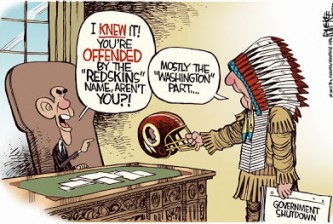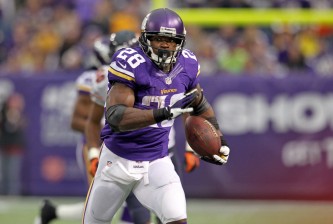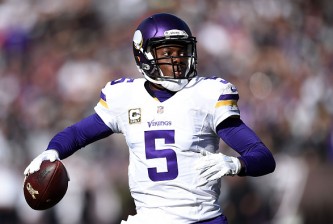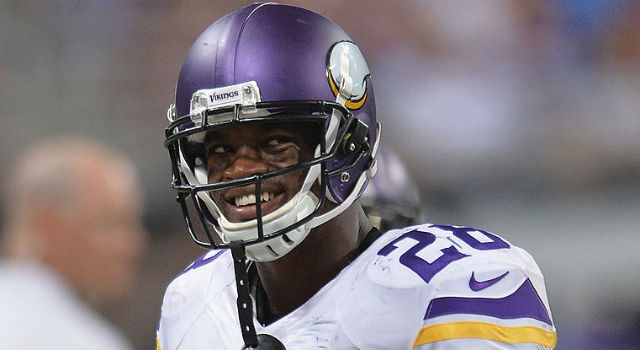Earlier this week Minnesota Vikings running back Adrian Peterson did something so very 2015: He fired up his laptop and/or mobile device, and decided he had some important things to say.
We have a common term for what happened next. Peterson “ranted”, and the Twitter rant is still an emerging art form. Those who lead in the craft know that with certain subjects and in certain situations, few good things come from broadcasting your passionate beliefs to the masses on an open forum. That’s especially true when you’re a noted public figure.
Which is where the flaws begin with what Peterson had to say about the state of laughably slanted NFL contracts, and the hammer teams hold over players.
He wasn’t wrong, and instead he likely spoke for most players. Anyone who thinks otherwise after digesting Peterson’s overall argument that players can be discarded spare parts at any moment should consider how little an agreement actually means in the NFL.
Each February and early March teams shed dollars as the new league year approaches. Those dollars often come in the form of aging players who aren’t performing up to their salary-cap figure. Previous agreements turn into absolute fluff.
I know hundreds of player’s that wished their team would’ve HONORED the contract! But instead got threw to the side like like trash.
— Adrian Peterson (@AdrianPeterson) May 28, 2015
There is little meaning beyond the guaranteed portion of a contract, and some deals are so absurd that reporting the full figure is high comedy.
For example, hop onto the same Twitter dot com medium whenever Cincinnati Bengals quarterback Andy Dalton has a particularly Dalton-like game with sprayed balls and several interceptions. You’ll see moaning about Dalton being a $96 million quarterback. That’s the full value of his six-year contract.
How much is guaranteed? Oh, a paltry $17 million. All of that guaranteed cash has now been paid to Dalton, and at any point he could be jettisoned with the remaining money evaportating.
Dalton is one example among many (San Francisco 49ers quarterback Colin Kaepernick has simlar funny money attatched to his name), and the potential for his abrupt end in Cinncinnati was the main thurst of Peterson’s keyboard punching.
It’s all about honoring you’re contract! Sounds like free will is being a lil challenged to me!
— Adrian Peterson (@AdrianPeterson) May 28, 2015
So no, Peterson isn’t wrong. He’s just the worst possible spokesperson for labor change in the NFL, and therefore logging off was probably in his best interest.
Peterson just spent nearly an entire season on the exempt/commissioner’s permission list, and in the process he earned $11.75 million. He did that as a 29-year-old running back at the time. Now he’s turned 30 and has a whopping 2,363 touches on his career odometer (including playoffs).
What he seems unable to grasp is that even in an alternate reality where NFL contracts are fully guaranteed, a player at his age and position isn’t worth anywhere near the $14.75 million base salary he’s set to make in 2016.
That’s the year under contention, according to NFL Network’s Ian Rapoport. None of Peterson’s scheduled pay in 2016 is guaranteed, because of course it’s not. The NFLPA was thoroughly owned during the lockout and 2011 collective bargaining process. In the end rich men became richer, and owners gained all the leverage over their menial football-playing peons.
But while (again) Peterson’s overall argument is true, he provides a horrible case study.
Let’s use our imaginations for a moment, and entertain that alternate universe with guaranteed contracts. The result would be lower overall base salaries, especially on the back end with teams hesitant to commit significant dollars long term. There would be a greater need to protect against age and declining production.
A running back of Peterson’s vintage would never be paid what he’s set to earn in 2015 and 2016, even in a strange world with fully guaranteed dollars. Within either salary structure—the current one, or the guaranteed one we’re imaging—Peterson would be paid far less on the open market.
He’s still a talented, powerful bundle of fast-moving muscles. But there’s no scenario in which a team would have any motivation to reward an aging running back with a massive payday. If the Vikings were to release Peterson the contract he eventually agreed to elsewhere would be substantially lower in 2015 and beyond.
That’s the central problem with his 140 character or less screed. Peterson was trying to be noble and take on the mighty NFL men who suppress his kind, a fight the players will only win by going on strike.
But while clashing with The Man, Peterson was also fighting for himself. Trying to do both ends in confusion, and a conversation that should be taking place only behind closed doors.























